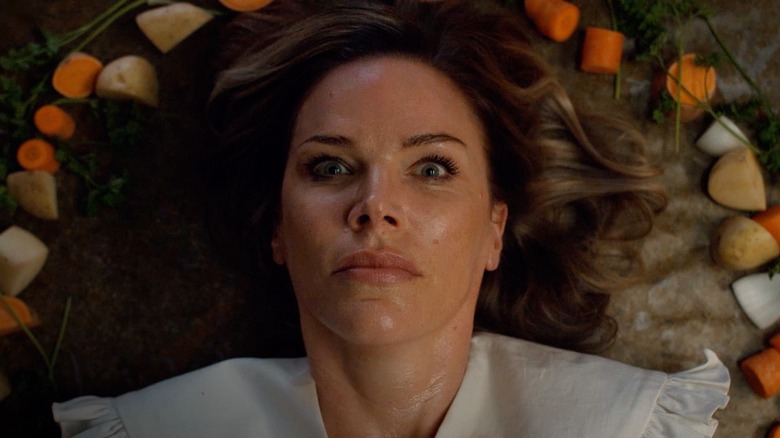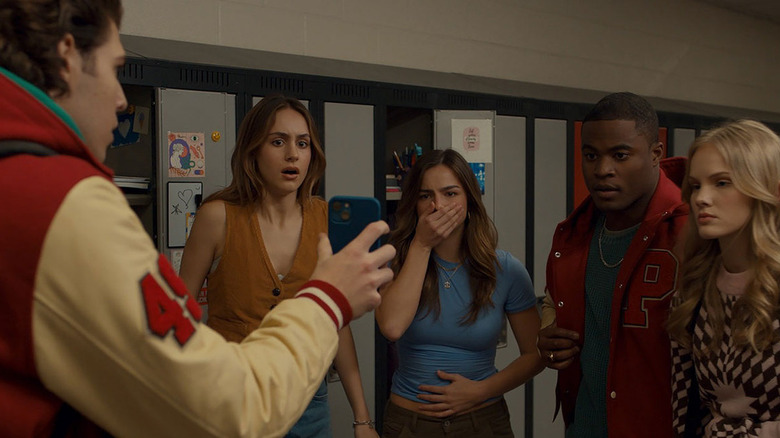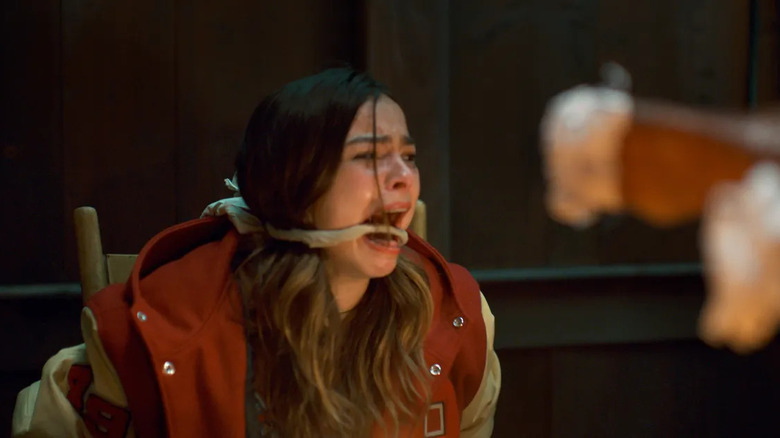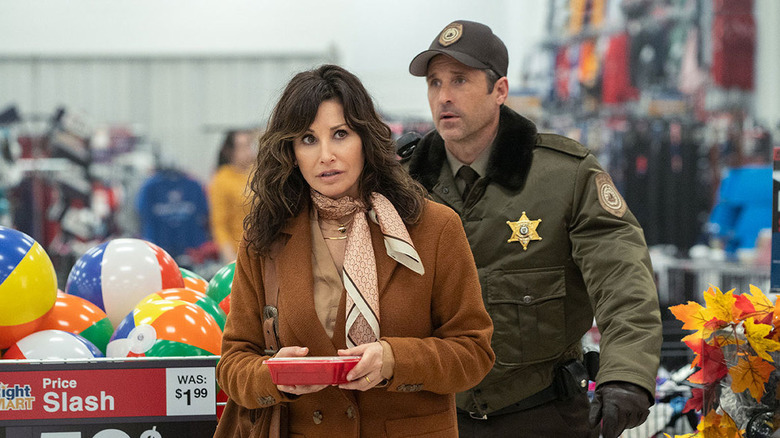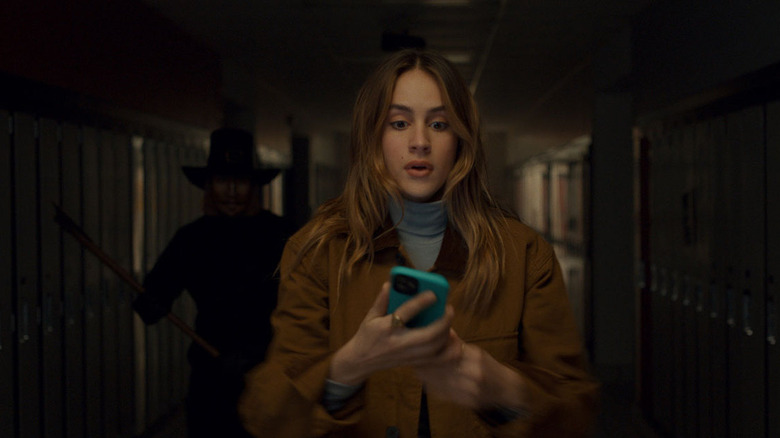Thanksgiving Director Eli Roth On Casting A Slasher And Putting Humor In Horror [Exclusive Interview]
Filmmaker Eli Roth has been working within the horror genre nearly exclusively since 2002, as his only non-horror feature to date is his 2018 remake of "Death Wish." The upcoming sci-fi/action video game adaptation "Borderlands" is set to break Roth's horror streak a second time when it (hopefully) releases next year. Since seven of Roth's nine films are horror, it's a little surprising to realize that "Thanksgiving," the feature-length adaptation of Roth's faux-trailer from 2007's "Grindhouse," is Roth's first official slasher movie.
As such, "Thanksgiving" sees Roth in classic slasher mode, paying tribute to a wide variety of predecessors in the subgenre ranging from classics like "Halloween" 1978 and "Scream" 1996 to more under-seen slasher gems like "Mother's Day" and "Happy Birthday to Me." Despite Roth's long and varied career, "Thanksgiving" was no simple parade, as he developed and shot the film within a single calendar year.
I had the opportunity to speak with Roth on the eve of the film's release, and we talked about how he went about putting together a quintessential slasher, how he believes that comedy-horror doesn't quite work but horror films still need comedy in them, and how the weird position and iconography of the Thanksgiving holiday in American culture is indicative of some systemic issues this country still faces today.
Note: This interview has been lightly edited for clarity and brevity.
'We want to follow all the conventions of the genre'
You've made a wide variety of films from big-budget to smaller-budget. Was approaching this, a classic down-and-dirty slasher, easier, more fun, and sort of scrappy? Or was it just as challenging, especially since you had only a year to make this?
It was very tough. I mean, look, this is the kind of movie where I only could have made [it] having made all my others, because it was low-budget. The schedule was really tight. We shot the whole thing in 35 days, so we had to fully nail it. We had to really, really nail it on the day, and every single day was a challenge, and we had an amazing time doing it. But every movie is tough in its own way, and this one was certainly no exception, but it's the kind of film I could have only made after I made all the others.
You have a great cast in this movie, a really cool ensemble, and when you're casting a slasher like this that has the whodunit element, how much thought is going into casting for the archetypes, in terms of suspicious-looking suspects versus more non-suspicious people to throw people off, or people that can scream, Final Girl qualities? Is that a consideration for you when you're casting this?
Oh, definitely, definitely. We want to follow all the conventions of the genre. There are certain things I just absolutely love about the genre, and the Final Girl is no exception. And when Nell Verlaque auditioned, we thought, she's so sympathetic. She's so sweet and nice. She's vulnerable. She's beautiful. She has this young Julia Roberts quality, and you just root for her. You want her to make it, and she's smart. And it's fun to watch: How is she going to get out of these situations where someone with a weapon could easily physically overpower her? What is she going to do to stay one step ahead?
A film that does that really well is "Mute Witness," the Anthony Waller film. I love that movie so much, and I had Nell watch it, and I went to a screening of it with my DP, which actually ran before we started shooting. It's one of my favorite films where the cat and mouse is so well done.
But yeah, you want to make sure that the guys are similar enough in certain features that you believe the red herrings work. And then, sometimes, an actor comes in who was supposed to be a suspect in the script, but they physically just don't match. But they're so funny or so good that you're just like, "All right, I'm willing to lose this person as a plausible suspect because I'm enjoying their performance so much."
'Every kill is tricky in its own way'
What was the hardest kill to pull off in the film, whether it was from a conceptual level or logistical level, or effects, or even the editing? Do you have one of those for this movie?
Well, every kill is tricky in its own way, and we're going for practical effects. Which means that it's going to be a huge reset, a huge clean-up, if it doesn't go right. And often, it doesn't. There was one in particular where the blood tubes kept getting tangled, and the blood wasn't spraying right, and the prosthetic wasn't splitting in the right way, and we just kept doing it. It was really hard. And then we're getting closer and closer and closer to the end of the shoot. And I'm like, "Man, I might not have this kill." And then it finally all came together on that last take, and you just can finally breathe because, with a movie like this, it really is about the kills. The kills have to work, or the movie doesn't work.
But that opening riot sequence was probably the most complicated sequence I've ever had to stage and deal with in my life. We shot the whole thing in four nights — two nights outside, two nights inside — and it was insanity. But the cast is amazing. The extras were incredible, fantastic stunt team, led by Dan Skene, our stunt coordinator, and [prosthetics designer] Adrien Morot, and the prosthetic effects and [prosthetics head] Steve Newburn makeup out of Toronto. So it was a really, really great team doing it, and we pulled it off.
'I think there's a real sickness there that there's no middle class anymore'
You have some really great social commentary through all your films. I'm a huge fan of "Hostel" Part I and II, and there's obviously stuff like "The Green Inferno" and "Knock Knock." Thanksgiving is a weird holiday in American culture. And you kind of touch upon that in this movie. I was curious to know what your view is on the holiday. What aspects of it did you want to get across in this?
I grew up in Massachusetts, so Thanksgiving was a huge, huge deal. So, to me, my relationship is going to be different than other people's, because there's two separate pilgrim recreation villages you go to. I remember doing a play when I was eight years old about the Native Americans feeding the pilgrims, and I actually took it over. I remember that I was telling the guy, I was like, "Well, why would I enter with a box of supplies from here? I should be doing this." He's like, "Fine." I actually took over directing the play, this little bossy eight-year-old. And the Thanksgiving parade, it's a huge deal in Massachusetts. I don't celebrate Christmas. So, for us, Thanksgiving was the big holiday of the fall season. You know, you go home, you watch football, you're having dinner, you're seeing your friends from high school. It was a great holiday, and it has slowly become completely infected and overrun by Black Friday sales for Christmas.
My phone, now, every hour, it's getting spammed with "Black Friday sale, Black Friday sale." There's no holiday anymore. It's just about Black Friday. So, I really wanted to make a movie about the Black Friday bleeding over, and this idea that we all say we're so thankful and just run out and trample each other for electronics and waffle irons. But I think there's something even darker underneath, which is that the people at the top that are benefiting from all of this aren't paying anybody. They haven't increased the minimum wage. No one's making a living wage anymore. So, everybody is forced to compete in these gladiator games because it's the only chance they can get to get the electronics and to get the things for their kids for Christmas.
So, I think there's a real sickness there that there's no middle class anymore. It's not about going to a sale and getting something on sale. It's these gladiator games where everybody has to crush each other to get it. Otherwise, they won't be able to afford it. So I think that, to me, is the real kind of ill underneath society. I think that what was once this great holiday that I love, that as a kid, was so important to me, has just been turned into gladiator games for waffle irons.
'I don't think comedy-horror necessarily works'
I wanted to talk for a second about your relationship to humor in your films, just because I do think there's a throughline from "Pancakes!" in "Cabin Fever" all the way to the scene with the cat in "Thanksgiving." I wouldn't consider you a comedy-horror guy necessarily, but you always have an element of humor in your movies, and it's so welcome. Do you try and bake that in, or does it just sort of happen naturally on set? Where does that come into your process?
Yeah, I don't think comedy-horror necessarily works. I feel like it's very limited in that you don't satisfy either [genre]. It's never scary enough to be a horror movie, and it's never funny enough to be a comedy. But I do believe that you can have humor as a release valve in a horror film. I think the best example of that is "Scream," where it's not a comedy, but the characters are fun characters and lively, and that is life. Not everyone is drab and serious all the time. When you have a cast like we had, where every single person's funny, you just lean into it.
So, there's characters we write that we know are funny, like McCarty, and then other ones that just bring a certain flair to it that the way they say a line is hilarious. Like Scuba, when he's like, "McCarty, do you have any human-sized guns?" You get a laugh just from that. So as long as it's real, and it's in character, and it makes sense in the situation. I feel like if I was in this situation, would I make that joke? Yes. Then I put it in the movie. And sometimes you go too far. In the editing, you're like, "This person has so many one-liners. They seem like they're the star of the movie." I'm like, "You're right. We've got to pull that back."
So you can have too much of it, and it can start to take away from your lead character. So that's something I'm very mindful of. But also, I want the kills to be fun. I want the kills to be awesome and amazing and brutal, but they're also a setup for the ones that are like, "Whoa, I didn't see that coming. That was rough." Sometimes, if you have a kill that's just left-of-center and is slightly ridiculous, the audience loves it. They applaud. It's great. I think it allows them to enjoy the violence if it's just a little bit skewed and a little bit insane.
"Thanksgiving" is in theaters everywhere today.
